



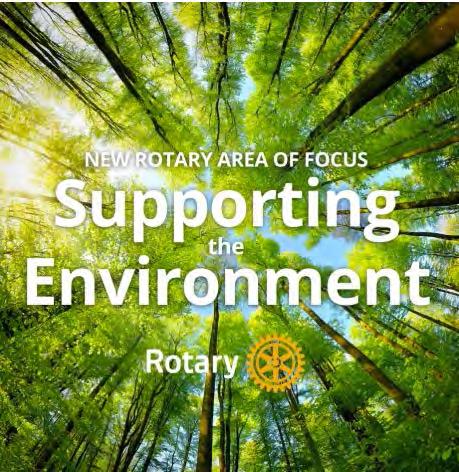






As I write this article , we move into the second day of COP30.
By the time this is published, COP30 it will be over, and unfortunately there is a certain pessimism that significant progress will be made, even if certain items are agreed to.
Follow-through has proven difficult in the past because goals remain unmet or are delayed.
The world order seems to be in chaos, and forward thinking is diminished in favour of politics, economics , misinformation, and “me first.”
Science is trusted less, and all the values we as Rotarians believe are being tested.

We’ve chosen a focus. Your D6330 Environment Committee cannot solve all these problems, but we have chosen to go with the science and focus on the top 2 solutions, Plant Rich Diets and Food Waste, as outlined by Project Drawdown.
Again, you might ask Why? My answer is –
“…because it is doable at our level and it fills all the Rotary boxes for health benefits, sustainability, GHG reduction, Peace and World Inequality.”
And you might also ask, “What about Rotary's 7 areas of focus?”
Katharine Hayhoe is a Canadian atmospheric scientist, professor, and climate communicator known for making complex climate science accessible and connecting it to people's values. She is the Chief Scientist for The Nature Conservancy, a Paul Whitfield Horn Distinguished Professor at Texas Tech University, and was recognized by Time as one of the 100 most influential people. She writes:

“Climate change is not a separate bucket at the end of the long list of buckets we care about; it’s not a separate issue on our voting priorities it’s the hole in every other bucket!
If you care about having a safe and affordable home that’s not going to be destroyed by a wildfire or a flood, if you care about the health of you and your family, if you care about the places where you grew up that you want to be there for future generations, if you care about being able to put food on the table and having clean water coming out of the tap then you care about climate change. We just haven’t made the connection. We still think it’s about polar bear and ice fields.”
When asked what the most important solution for Climate Change was at the end of the interview she said, “Your voice.”
Science-backed research shows that our current North American food system is increasingly unsustainable — for people, for the planet, and for future generations.
The global picture is stark:
• 3 billion people worldwide — including children — are food-insecure or starving.¹
• 1 billion people are overweight or obese.²
• Our dietary patterns are shortening our lives and driving a rise in chronic, preventable illness.³
One example is the inefficiency of meat production. It takes five calories of plant food to produce one or two calories of meat.⁴ If a vehicle ran on that kind of fuel efficiency, none of us would buy it.
So why do we accept it in the way we feed ourselves?
Imagine what we could do with those same resources — that land, that water, that energy!
• We could feed people directly.
• We could restore forests.
• We could rebuild ecosystems.
• And we could dramatically reduce the environmental cost of our meals.
A shift toward a more plant-rich diet is one of the simplest, most impactful actions individuals and communities can take. It supports global food security, protects our environment, and leads to healthier lives.
Small changes, multiplied across many households, can reshape the future.
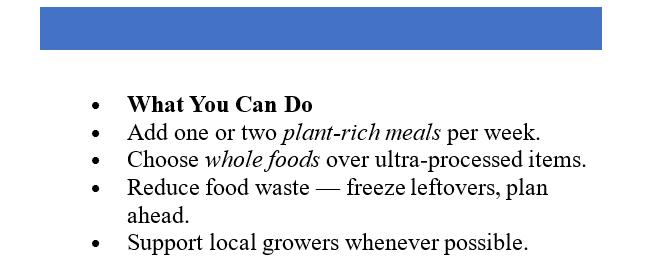
Footnotes
¹ FAO. State of Food Security and Nutrition in the World (SOFI Report).
² World Health Organization. Obesity and Overweight Factsheet.
³ Global Burden of Disease Study (GBD), The Lancet.
⁴ UNEP, FAO livestock efficiency analyses; average feed-to-calorie ratios across major meat types (beef, pork, poultry).
The Planetary Diet – Plant Rich
It’s NOT vegetarian or vegan – (but kudos to those that can do.)
We are asking you simply to consider adding more plant-based meals to your diet!
The diet’s name arose from the evidence suggesting that its adoption would reduce the environmental impacts and nutritional deficiencies of most current diets!
How might you start! …like me.
• Double your fruits, vegetables and add a salad.
• Add beans and lentils to soups and sauces or stand-alone recipes.
• Source some good plant rich recipes. My favorite is black bean salad.
• Add some nuts/granola to yogurt, salads, snacks and desserts.
• Cook with olive oil, but keep temperatures lower to maintain benefit.
• Snack on bell peppers, carrot sticks, celery, and cucumber or broccoli pieces dipped in flavored humus. Hummy!
• Enjoy meat and dairy - but allow less.
• Go whole wheat and grains - bread, pasta, rice
• Source locally when available.
• Visit the Plant Rich ESRAG site for recipes and maybe take any form of the challenge. (i.e., 1, 2, or 3 days per week)
Municipalities are taking up the challenge!
Universities are taking up the challenge.
ESRAG and Science are leading the way.
How about Rotary Clubs?


By Chris Davies
Many Rotarians find themselves trapped in a familiar pattern: waiting for someone else to solve the climate crisis. Whether the government, corporations, or some breakthrough technology will emerge and thus enabling them to put their environmental conscience on hold. It may take joining ESRAG to realise that we don't need to wait for political shifts or new technologies to make a meaningful impact. The most powerful climate action might already be sitting in our kitchens.
Whilst we often think of solar panels, electric vehicles, or complex carbon capture technologies as the primary solutions to climate change, there are simpler, more accessible options that deliver immediate results. One such is adopting a plant-rich diet. Project Drawdown, the comprehensive global research initiative, cites plant-rich diets as the second most impactful action we can take to reverse climate change, ranking just after food waste reduction.
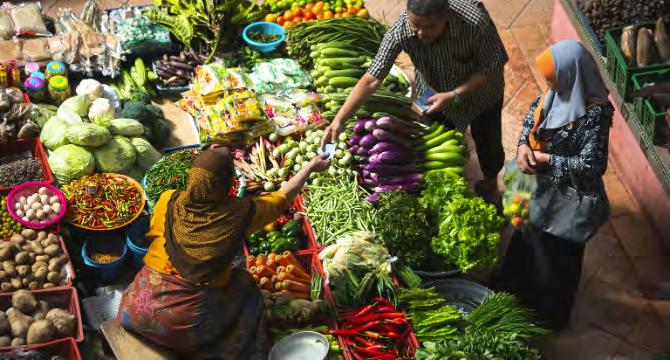
This isn't merely about personal health, though the benefits there are substantial. Agriculture is the single greatest driver harming the systems that support our lives, contributing more to global warming than all forms of transportation combined. The global livestock industry produces 32% of global man-made methane emissions, second only to the fossil fuel industry which produces 35%. Even if we completely eliminated fossil fuels tomorrow, food systems alone would contribute to 1.5-2°C of global warming – a threshold we cannot afford to cross.
"What difference can I make?" is perhaps the most common question from climate-conscious individuals. But here's the powerful truth: everything we do as individuals to reduce our footprint benefits the whole of humanity. Unlike waiting for large-scale policy changes or technological breakthroughs, dietary choices offer immediate, measurable impact. Small changes can add up to a huge positive impact for your health and the planet.
The beauty of plant-rich eating lies in its accessibility. Whilst solar panels might cost thousands and electric vehicles remain out of reach for many, choosing more vegetables, fruits, whole grains, and legumes is often cheaper than meat-heavy diets. You don't need special equipment, technical expertise, or significant upfront investment. You don't have to go "fully plant-based" to make a difference, though 100% plant-based eaters can reduce their carbon footprints by up to 75%. Simply shifting the balance of your diet towards more plant foods in whatever way works for you is an effective multi-purpose tool.
Click here to read the rest of the article
Why the confusion? Too many diets!
Mediterranean Diet. We have known for a while that the Mediterranean Diet heavy in olive oil, fish, fruits and vegetables, legumes and nuts had definite health benefits.
Vegan and Vegetarian Diets. We know that vegan and vegetarian diets are good, but they must be carefully planned and prepared. Otherwise, they may lack B12 and two essential proteins. And most of us will not subscribe to the diet for personal reasons (preferred taste).
And beware of using these diets for children!
Our Preference and Recommendation
Planetary Diet. The more accepted diet is the Plant-Based Approach (Planetary Diet) with proven health benefits (through the E lancet study - a combination of studies with tens of thousands of participants.
Simply, this diet follows the ½, ¼ rule. That means that
• ½ of your plate should be fruits and vegetables
• ¼ of your plate should be protein, including some meat and dairy, and
• ¼ of your plate should be legumes (beans) and nuts.
Some meat is allowed in the protein section, and the type of meat is measured by its environmental impact. It is simple. It is a simple diet to follow.
• Simply ADD – do not subtract!
• Start low and go slow so change is gradual.
Nobody likes big change.
• Be comfortable with the changes you make, however small or large they are
• Enjoy the health benefits almost immediately,
Key takeaways
• The planetary health diet focuses on eating in a way that’s good for the environment.
• Eating more plants and fewer animal-based foods has been shown to have health benefits.
• Eating mostly plants can have a positive impact on the planet.
The proof is in the pudding!
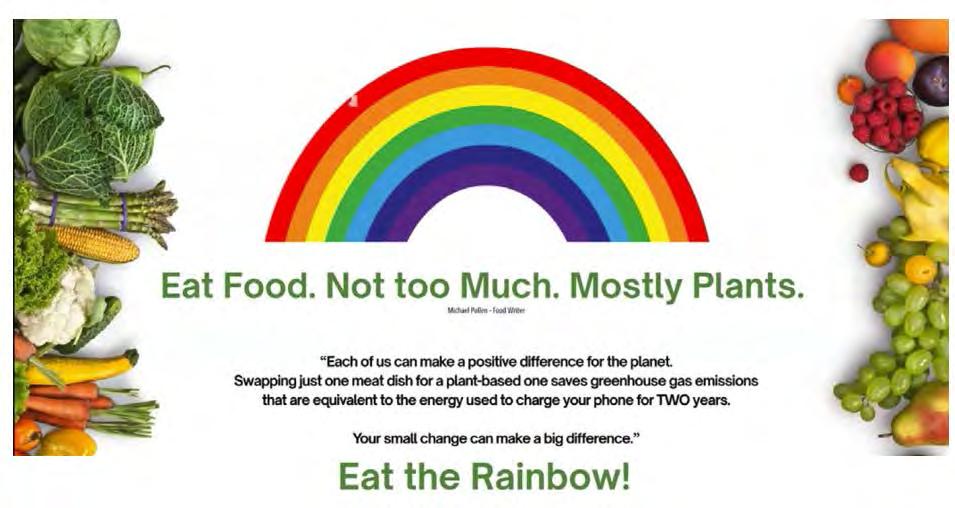
Now back to the point that developing countries are not the main problem.
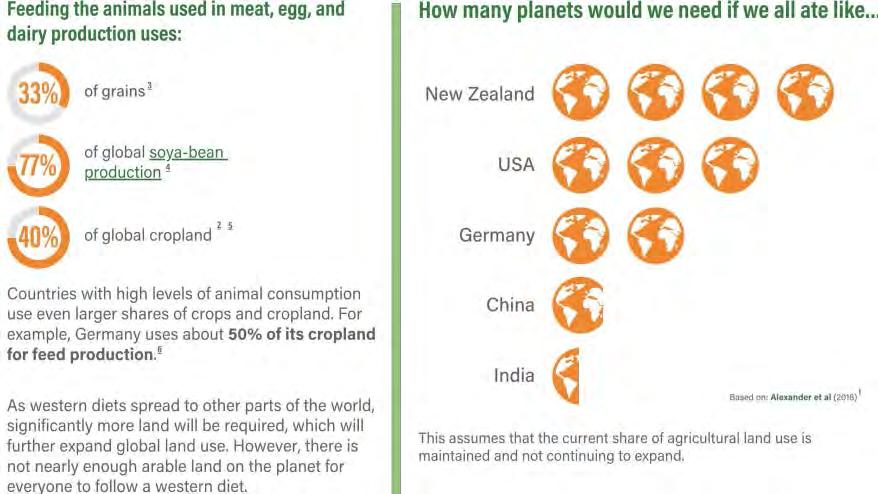
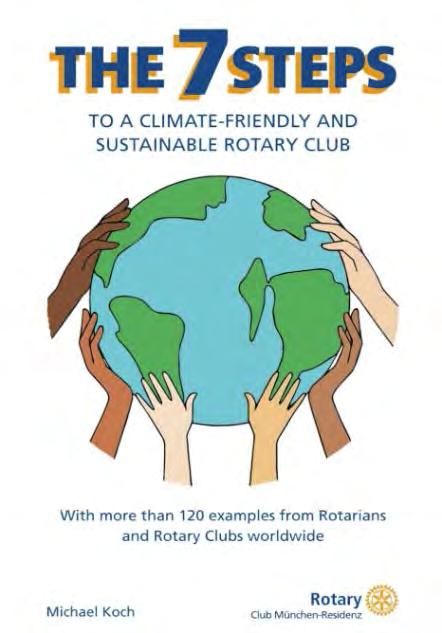

Interested in other ways to help the environment? Here’s a book, written by a Rotarian, with many proven ideas! Consider it for your Rotary club!
Purchase from amazon.ca. Click here.
• Raising awareness about the relevance of clime change for Rotary
• Important knowledge about climate change
• The seven steps for your club to become climate-friendly
• Online tool to estimate a club’s carbon footprint/handprint
• Recommended Rotary projects for financial compensation of CO2
• Effective projects with climate & social impact
• Best practice actions to reduce CO2
• How to make districts and events carbon neutral
• 120+ examples from Rotarians and Rotary Clubs
First Generation. Remember we are the First Generation to experience the effects of climate change
Last Generation. …and the Last Generation able to do anything about it!
time in the sun!
WHAT YOU CAN DO
• Start your plant-rich diet today!
• Spread the word!
• Hold a plant-rich diet luncheon for your club!
• Share Recipes!
• We can do this together!

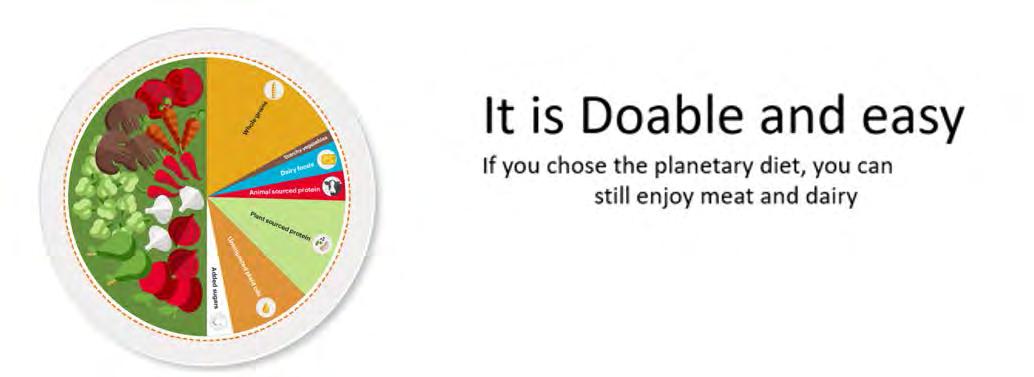

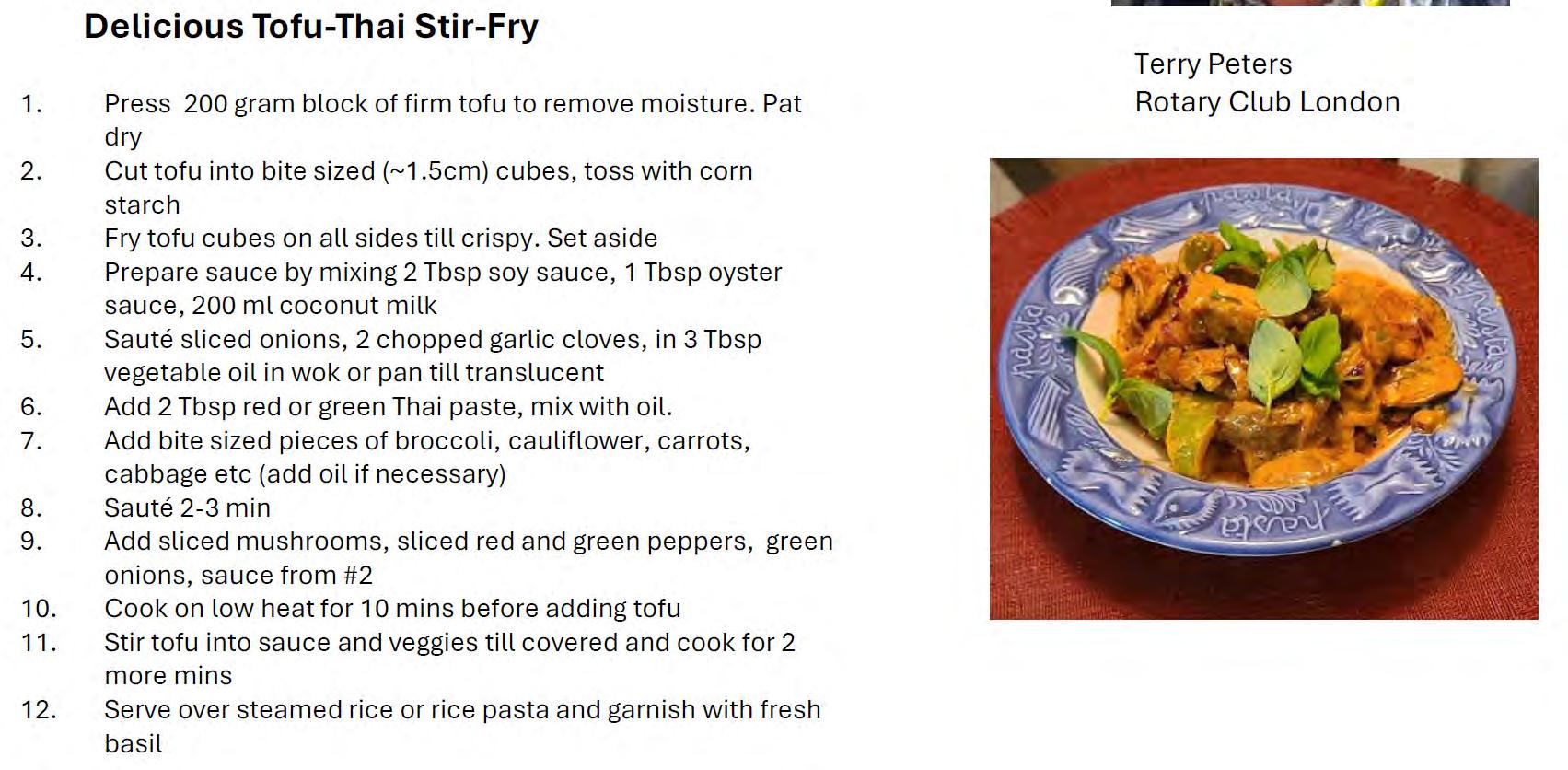
A personal message –
Hi everyone! I am a member of the Rotary Club of Stratford and Chair of District 6330 Environment Committee. I chose a Plant Rich diet because I have 5 grandchildren, and I want to leave them a sustainable world and be able to feed the world equitably including 1 million starving children.
By the way, for the record, I cannot give up cheese, and I also enjoy an occasional chicken and fish meal. Nobody is perfect! � �� ���

My favourite recipe is a Veg Mushroom Bourgeon over whole wheat rice or pasta of your choice, accompanied with a black bean salad.
Here’s a link to the first recipe – and a photo –


https://veganheaven.org/recipe/mushroom-bourguignon-super-easy-recipe/
And don’t be afraid to add extra vegetables, e.g. peas, broccoli, potatoes/squash
…and a link to the second recipe (plus photo)
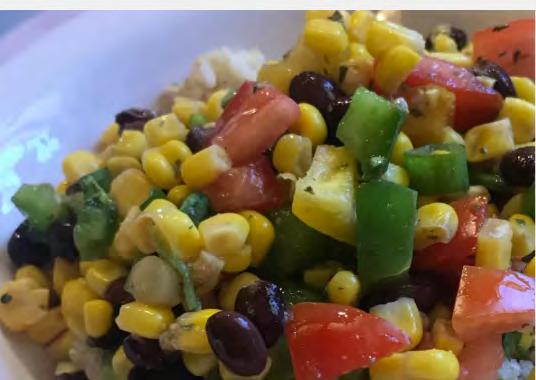
https://www.allrecipes.com/recipe/14304/black-bean-salad/
Maybe for this recipe, you can omit the jalapeno and add some lime juice to taste.

Plus a very helpful website to follow -

https://www.keepingthepeas.com/plant-based-christmas-dinner/#plant-based-christmas-main-course
Please share your recipes so that we can all share the joy!!
We’ll highlight them in an upcoming newsletter! Click here to view a short video by ESRAG.
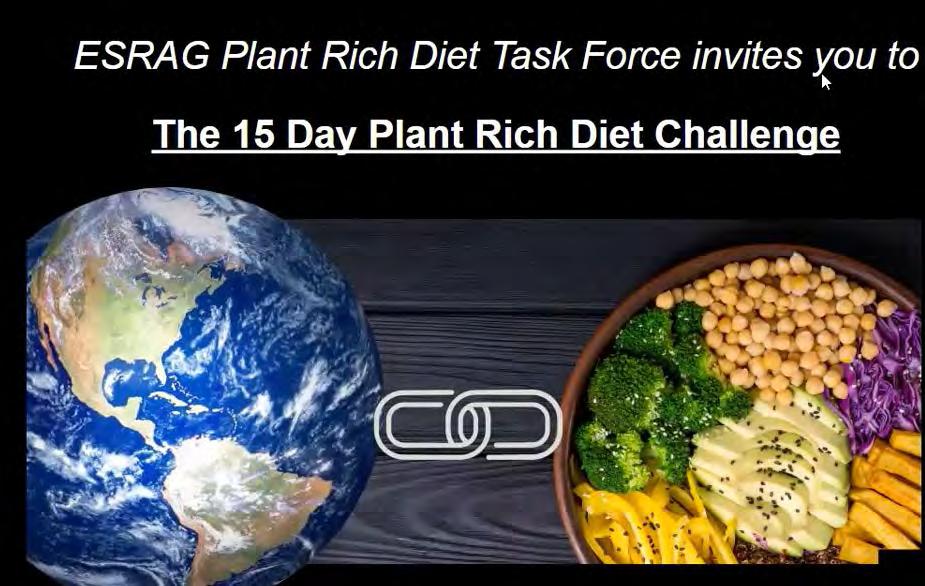

EARTH DAY – WEDNESDAY - APRIL 22, 2026
However, we can celebrate our fragile earth every single day!


When tomorrow comes, this day will be gone forever. In its place is something that you have left behind. Let it be something good. 1 1 Author unknown